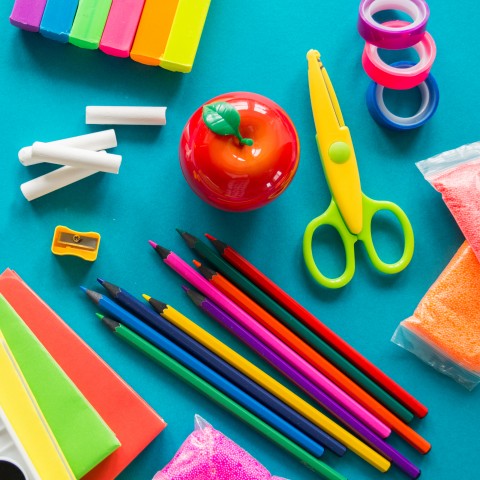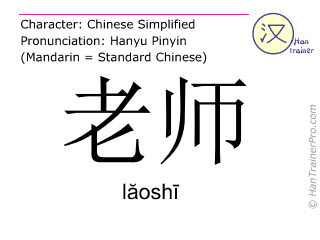Imagine you are sitting in a Chinese classroom with Chinese students at a Chinese high school. Would you be able to use proper classroom greetings to greet your teacher and classmates in Mandarin Chinese? Would you be able to understand your Chinese teacher’s classroom command phrases? Would you have enough Chinese classroom vocabulary words and phrases to communicate with classmates and teachers? Would you have confidence in your Chinese grammar skills to produce phrases and express yourself accurately and freely?
If any of your answers are “no,” you’ve come to the right place! In this article, you will learn all about Chinese classroom phrases and school-related basic Chinese words and phrases. Our goal is to make your Chinese language learning easy, fun, and meaningful!
No time to read the whole article? No problem. Check out our Back to School cheat sheet for Chinese basic phrases and vocabulary with a school and classroom theme for a quick reference!
Table of Contents
- Use Classroom Greetings
- Understand Instructions from Teachers
- Comments and Feedback
- Ask Questions to Teachers and Classmates
- Talk about Favorite Subjects
- Check for School Supplies
- Last But Not Least
1. Use Classroom Greetings
1 – Formal Greetings in a Classroom
Traditionally in Chinese primary schools and secondary schools, students and teachers greet each other formally at the beginning and end of a class. As soon as the teacher enters the classroom, a student whose role is 班长 (bānzhǎng) “class leader” orders the whole class to stand up and greet the teacher in chorus. Although it might not be this formal in your Mandarin Chinese class, it’s good to know what these phrases mean!
Usually, the greetings at the beginning of the class go in the order below:
- ➢ 老师: 上课!Lǎoshī: Shàngkè!
“Teacher: Class begins!”
- 班长:起立!Bānzhǎng: Qǐlì!
“Class leader: Stand up!”
- ➢ 老师:同学们好!Lǎoshī: Tóngxuémen hǎo!
“Teacher: Hello, students!”
- 全班同学:老师好!Quán bān tóngxué: Lǎoshī hǎo!
“Whole class: Hello, teacher! ”
At the end of a class, the greetings are similar:
- ➢ 老师: 下课!
Lǎoshī: Xiàkè!
“Teacher: Class ends!”
- 班长:起立!Bānzhǎng: Qǐlì!
“Class leader: Stand up!”
- ➢ 老师:同学们再见!Lǎoshī: Tóngxuémen zàijiàn!
“Teacher: Goodbye, students!”
- 全班同学:老师再见!Quán bān tóngxué: Lǎoshī zàijiàn!
“Whole class: Goodbye, teacher! “
Note: in this article
➢ marks teacher phrases
• marks student phrases
2 – Informal Greetings on Campus
Nowadays, more and more schools choose not to adopt the rigid formal classroom greetings shown above. Instead, the teacher gets right to teaching without greetings or very informal greetings. However, outside a classroom on the school campus, students are still expected to greet their teachers to show respect. When it comes to students greeting each other, it gets casual.
Here are some scenarios of informal greetings between a student and a teacher, and between two students.
Scenario #1: 夏雨 (Xià Yǔ) “Yu Xia,” a student sees his teacher 刘老师 (Liú lǎoshī) “Teacher Liu” in the hallway before the first bell rings.
- 夏雨: 刘老师好!Xià Yǔ: Liú lǎoshī hǎo!
“Yu Xia: Hello, Mr. Liu.”
- ➢ 刘老师: 早!Liú lǎoshī: Zǎo!
“Teacher Liu: Morning!”
Scenario #2: 夏雨 (Xià Yǔ) Yu Xia sees his teacher 刘老师 (Liú lǎoshī) Mr. Liu while waiting on the bus to go home.
- 夏雨: 刘老师再见!Xià Yǔ: Xú lǎoshī zàijiàn!
“Yu Xia: Goodbye, Mr. Liu”
- ➢ 刘老师: 再见!Liú lǎoshī: Zàijiàn!
“Teacher Liu: Goodbye!”
Scenario #3: 夏雨 (Xià Yǔ) “Yu Xia” walks in the classroom while her friend and classmate 王明一 (Wáng Míngyī) “Mingyi Wang” is finishing up his homework.
- 夏雨: 早啊!赶作业呢?Xià Yǔ: Zǎo a! Gǎn zuòyè ne?
“Yu Xia: Morning! Still working on your homework?”
- 王明一: 嗯。还有一页。Wáng Míngyī: En. Háiyǒu yí yè.
“Mingyi Wang: Yeah. One more page to go.”
Scenario #4: 夏雨 (Xià Yǔ) “Yu Xia” says goodbye to 王明一 (Wáng Míngyī) “Mingyi Wang” as she gets off the bus.
- 夏雨: 我走了。明天见。Xià yǔ: Wǒ zǒule. Míngtiān jiàn.
“Yu Xia: I’m leaving now. See you tomorrow.”
- 王明一: 拜拜!Wáng Míngyī: Báibái!
“Mingyi Wang: Byebye!”
- ❖ Linguistic Iinsight
| Keyword | Usage | Examples | |
| Greetings | 好 (hǎo) “good” | Time + 好 (hǎo) Title + 好 (hǎo) |
早上好。Zǎoshang hǎo. “Good morning.” (lit. “Morning good.”) 老师好。Lǎoshī hǎo. “Hello, teacher.” (lit. “Teacher good.”) |
| Parting Expressions | 见 (jiàn) “to see” | Time + 见 (jiàn) Place + 见 (jiàn) |
明天见。Míngtiān jiàn. “See you tomorrow. “学校见。Xuéxiào jiàn. “See you at school.” |
2. Understand Instructions from Teachers
Teachers play a key role in learning. Knowledge and skills are delivered by teachers through their instructions. There is nothing more important than understanding the teacher and following his or her instructions. In this section, we’ll take a close look at command phrases teachers are most likely to use in a class.
1 – Instructions and Commands
- ➢ 请拿出课本。Qǐng ná chū kèběn.
“Please take out your textbook.”
- ➢ 请翻到第五十页。Qǐng fān dào dì wǔshí yè.
“Please turn to page fifty. “
- ➢ 请看黑板。Qǐng kàn hēibǎn.
“Please look at the blackboard.”
- ➢ 请跟我读。Qǐng gēn wǒ dú.
“Please read after me.”
- ➢ 请仔细听。Qǐng zǐxì tīng.
“Please listen carefully.”
- ➢ 不要说话。Búyào shuōhuà.
“Do not talk.”
- ➢ 举手回答。Jǔ shǒu huídá.
“Raise your hand to answer (the question).”
- ➢ 小组讨论一下。Xiǎozǔ tǎolùn yíxià.
“Discuss within your group.”
- ➢ 把作业交上来。Bǎ zuòyè jiāo shànglái.
“Hand in your homework.”
- ❖ Cultural note: 请 (qǐng) makes a polite command. But since teachers are higher on the social hierarchy, they don’t always use 请 (qǐng) with their students.
2 – Questions and Check-ins
- ➢ 懂了吗?Dǒngle ma?
“Understand now?”
- ➢ 听明白了吗?Tīng míngbái le ma?
“Did you understand what I said?”
- ➢ 有没有问题?Yǒu méiyǒu wèntí?
“Questions? “
- ➢ 你同意吗?Nǐ tóngyì ma?
“Do you agree?”
- ➢ 确定吗?Quèdìng ma?
“Are you sure?”
- ➢ 谁想来试试?Shéi xiǎnglái shì shi?
“Who wants to give it a try?”
3 – Comments and Feedback
- ➢ 不错。Búcuò.
“Not bad.”
- ➢ 非常好。Fēicháng hǎo.
“Excellent.”
- ➢ 很棒。Hěn bàng.
“Great.”
- ➢ 很有新意。Hěn yǒu xīnyì.
“Very creative.”
- ➢ 不完全对。Bù wánquán duì.
“Not entirely true.”
- ➢ 不准确。Bú zhǔnquè.
“Not accurate.”
- ➢ 你再想想。Nǐ zài xiǎng xiǎng.
“Think about it more.”
- ❖ Cultural note: Teachers from older generations tend to be more harsh and direct with negative comments, while younger teachers tend to use more gentle approaches when offering feedback. If you’re going to attend school in China, especially for those of you with prior education from the West, be aware of and prepared for the cultural differences. Read this article to learn more about the schooling differences between China and America.
3. Ask Questions to Teachers and Classmates
It’s okay to not understand Chinese classroom phrases, all you have to do is to ask! Here are some useful phrases to ask questions to your Chinese teachers and classmates.
1 – Asking Teachers for Clarification
- 老师,能再说一遍吗? Lǎoshī, néng zài shuō yí biàn ma?
“Teacher, can you say it again?”
- 老师,能说慢一点吗?Lǎoshī, néng shuō màn yì diǎn ma?
“Teacher, can you say it slower?”
- 老师,我有一个问题。Lǎoshī, wǒ yǒu yí gè wèntí.
“Teacher, I have a question.”
- 老师,我没听懂。Lǎoshī, wǒ méi tīng dǒng.
“Teacher, I didn’t understand.”
- 老师,[WORD] 是什么意思?Lǎoshī, [WORD] shì shénme yìsi?
“Teacher, what does [WORD] mean?”
2 – Asking Classmates for Help
- 老师说了什么?Lǎoshī shuō le shénme?
“What did the teacher say?”
- 老师让我们干什么?Lǎoshī ràng wǒmen gàn shénme?
“What did the teacher want us to do?”
- [X] 字怎么写?[X] zì zěnme xiě?
“How do you write [X]?”
- 这个怎么读?Zhège zěnme dú?
“How do you read this?”
- 你能教我一下吗?Nǐ néng jiào wǒ yíxià ma?
“Can you teach me?”
- 今天的家庭作业是什么?Jīntiān de jiātíng zuòyè shì shénme?
“What’s the homework for today?”
4. Ask for Leave of Absence and Explain Tardiness
Students are expected to report their absence to the teacher at least one day ahead of time. When arriving late, they are supposed to explain the reason for their tardiness. Here are some phrases for your reference to prepare you for these situations.
For Absence
- 明天我得请假。Míngtiān wǒ děi qǐngjià.
“I have to ask for a leave of absence tomorrow.”
- 我不舒服,明天想请假。Wǒ bù shūfú, míngtiān xiǎng qǐngjià.
“I don’t feel well. I’d like to ask for a leave of absence tomorrow.”
- 老师,我能跟您请个假吗?Lǎoshī, wǒ néng gēn nín qǐng gè jiǎ ma?
“Teacher, may I ask for a leave of absence?”
For Tardiness
- 抱歉。我迟到了。Bàoqiàn. Wǒ chídào le.
“Sorry I’m late.”
- 不好意思,我迟到了。我能进来吗?Bù hǎoyìsi, wǒ chídàole. Wǒ néng jìnlái ma?
“Sorry I’m late. May I come in?”
- 老师对不起,我起晚了。Lǎoshī duìbùqǐ, wǒ qǐ wǎn le.
“Sorry, teacher. I got up late.”
- 路上堵车, 所以我来晚了。Lùshàng dǔchē, suǒyǐ wǒ lái wǎn le.
“The traffic was bad, that’s why I arrived late.”
5. Talk about Favorite Subjects
Chinese elementary and secondary schools rotate between 6-8 subjects every day, focusing heavily on academics. Since subjects in universities and colleges vary to a great extent depending on the major, let’s take a look at some middle and high school subjects.
| 语文 yǔwén | Chinese |
| 英语 yīngyǔ | English |
| 数学 shùxué | Math |
| 体育 tǐyù | Physical Education |
| 音乐 yīnyuè | Music |
| 物理 wùlǐ | Physics |
| 生物 shēngwù | Biology |
| 化学 huàxué | Chemistry |
| 历史 lìshǐ | History |
| 地理 dìlǐ | Geography |
| 政治 zhèngzhì | Politics |
Here are some sentence patterns to talk about school subjects.
- 我最喜欢 [SUBJECT]。Wǒ zuì xǐhuān [SUBJECT].
“I like [SUBJECT] the best”
- 我 [SUBJECT] 不好。 Wǒ [SUBJECT] bù hǎo.
“I’m good at [SUBJECT].”
- 明天有 [SUBJECT] 课。 Míngtiān yǒu [SUBJECT] kè.
“Tomorrow we have [SUBJECT].”
- 后天有 [SUBJECT] 考试。Hòutiān yǒu [SUBJECT] kǎoshì.
“The day after tomorrow, we have a [SUBJECT] test.”
- 下节课是 [SUBJECT]。Xià jié kè shì [SUBJECT].
“Next class is [SUBJECT].”
- 你的 [SUBJECT] 老师是谁?Nǐ de [SUBJECT] lǎoshī shì shéi?
“Who is your [SUBJECT] teacher?”
6. Check for School Supplies
You can’t go to school without any school supplies! They are must-know words if you are going to school in China. Let’s learn all the essential school and classroom supplies in Chinese.
| 书包 shūbāo | backpack |
| 书 shū | book |
| 笔记本 bǐjìběn | notebook |
| 笔 bǐ | pen |
| 铅笔 qiānbǐ | pencil |
| 马克笔 mǎkèbǐ | marker |
| 圆珠笔 yuánzhūbǐ | ballpoint pen |
| 橡皮 xiàngpí | eraser |
| 尺 chǐ | ruler |
| 笔袋 bǐdài | pencil bag |
| 卷笔刀 juànbǐdāo | pencil sharpener |
| 剪刀 jiǎndāo | scissors |
| 水壶 shuǐhú | water bottle |
| 饭盒 fànhé | lunch box |
Here are some sentence patterns to talk about school supplies.
- 你带[SUPPLY] 了吗?Nǐ dài [SUPPLY] le ma?
“Did you bring [SUPPLY]?”
- 我的[SUPPLY] 不见了。Wǒ de [SUPPLY] bújiàn le.
“My [SUPPLY] is missing.”
- 能借我用一下你的[SUPPLY] 吗?Néng jiè wǒ yòng yīxià nǐ de [SUPPLY] ma?
“Can I borrow your [SUPPLY] ?”
- 你的[SUPPLY] 哪儿买的?真好用。Nǐ de [SUPPLY] nǎ’er mǎi de? Zhēn hǎo yòng.
“Where did you buy your [SUPPLY]? It’s so good.”
7. Last But Not Least
If you enjoy learning through blog articles like this, get on ChineseClass101.com’s blog to explore more practical Chinese phrases, expressions, culture and more!
If you can benefit from learning Chinese in a faster and personalized way, get your own personal tutor with a Premium PLUS subscription. Just let your teacher know what you’d like to work on, he/she will create your own personal learning pathway, and give you immediate feedback to bring your Chinese to the next level! See you on ChineseClass101.com!

| teacher | |
| 1. 名词. 教師、老師 | |
| Components | |
| 老 | |
| 1. old, aged, elderly (for persons, animate and inanimate objects generally) | |
| 2. experienced | |
| 3. overcooked, tough, stringy, hard (used in reference to cooked food or meat) | |
| 4. stale, not fresh (used in reference to food or potable liquids) | |
| 5. always, all the time | |
| 6. (chiefly dialectal) very, quite | |
| →很 | |
| 7. (affectionate, respectful) Used before surnames to refer to heads or elder members of families. | |
| →小 (for younger people) | |
| 8. (usually respectful and affectionate) Used by analogy in several other relationship terms. | |
| 9. (zoology) Used before several animals considered noxious or unpleasant. | |
| 10. (colloquial) Used before placenames, particularly countries, to form nouns. | |
| 师 | |
| 1. (historical, military) division of 2500 soldiers | |
| 2. (military) division; a large body of troops composing part of an army | |
| 3. army; troops; armed force | |
| 4. to dispatch troops; to send troops | |
| 5. the masses; populace; general public | |
| 6. (historical) (A level of administrative division comprising ten major cities.) | |
| 7. capital city; metropolis | |
| 8. strategist; military adviser | |
| 9. leader; chief; commander; head; captain | |
| 10. teacher; instructor | |
| 11. master; expert; specialist | |
| 12. (Min Dong) to be an expert in; adept at; capable | |
| 13. (Min Dong) (Respectful term of address for an expert in a trade or profession.) | |
| 14. (religion) (Respectful title for monks, nuns and Taoist priests.) | |
| 15. (historical) musician | |
| 16. model; example; fine example | |
| 17. to follow; to imitate; to follow the example of | |
| 18. “Army” (䷆): the seventh hexagram of the I Ching |
Another word for teacher in Mandarin Chinese?
I recently watched a film in Mandarin Chinese about a teacher, and not once the word «laoshi» was used. Is it possible to just say «shi» or is there another word for «teacher»?
Asked by Charles —
Chinese for Kids — 2 Answers
Answers
Answerer 1
I am learning Chinese at school now. My Chinese teacher tells us that the Chinese characters for “teacher” is “老师.” And I don’t know if just using “shi” is right.
, answered by
Jack
Answerer 2
The answer to your question regarding SHI
Short answer, NO, «shi» is not supposed to be used alone, at least not in morden Chinese.
Long answer, YES, «shi» can be used alone, usualy appears in classic Chinese literature which I dont think you will encounter in daily conversation.
There are many Chinese ideographs / characters that does not possess a complete meaning if stand alone by itself.
(and there is a term for this situation for which I have forgotten).
In address your curiosity for other word for teacher,
1) 教師 = teacher
But you’d never address your instructor as 教師, you call him/her 老師
教師 is more used in formal writing.
2) 教授 = professor
Same meaning as in professor of a university
3) 先生 = teacher (Cantonese & Japanese)
Mandarin learners dont need to know this one.
========================================
some usage of SHI
良師益友 = good teach and benefitial friends [Modern Chinese]
師父 = master, as in Kung Fu master [Modern Chinese]
出師 = lead the army to war [Classic Chinese]
=======================================
, answered by
(o_O)
You might be interested in the following questions:
Things to be thankful for in Chinese
26 Nov 2014
in General Q&A
Tags: Chinese word for friends, Chinese word for health-care professionals, Chinese word for music, Chinese word for society, Chinese word for teacher, Chinese word for the Internet, Chinese word for web page, How to say fresh air in Chinese, How to say Happy Thanksgiving in Chinese, Learn Chinese word for family members, Learn Chinese word for parents, What’s a mailman called in Chinese
Pumpkin and Acorn Squash
As I bring in an acorn squash from my garden as the last of the harvest of the year, my heart is filled with gratitude. Indeed I’m thankful for many other things. Here is a partial list. I am sure you can add many more to your own list (in Chinese, please).
感谢父母的养育.
Gǎnxiè fùmǔ de yǎngyù.
Thanks to my parents for bringing me up.
感谢家人的爱护.
Gǎnxiè jiārén de àihù.
Thanks to my family members for loving me.
感谢老师的教导.
Gǎnxiè lǎoshī de jiàodǎo.
Thanks to my teachers for educating me.
感谢朋友分享欢乐及分担忧虑.
Gǎnxiè péngyǒu fēnxiǎng huānlè jí fēndān yōulǜ.
Thanks to my friends for sharing my joys and worries.
感谢邻居的友情和帮助.
Gǎnxiè línjū de yǒuqíng hé bāngzhù.
Thanks to my neighbors for their friendship and help.
感谢同事的合作.
Gǎnxiè tóngshì de hézuò.
Thanks to my colleagues for their collaboration.
感谢农人生产粮食.
Gǎnxiè nóngrén shēngchǎn liángshi.
Thanks to the farmers who produce food for us.
感谢医护人员的医疗.
Gǎnxiè yī hù rényuán de yīliáo
Thanks to the health care professionals for their treatments
感谢邮差递送信件及包裹.
Gǎnxiè yóuchāi dìsòng xìnjiàn jí bāoguǒ.
Thanks to the mailman for delivering the mail and packages.
感谢能够居住在稳定的社会.
Gǎnxiè nénggòu jūzhù zài wěndìng de shèhuì.
Thanks for being able to live in a stable society.
感谢能够呼吸新鲜的空气及喝清洁的水.
Gǎnxiè nénggòu hūxī xīnxiān de kōngqì jí hē qīngjié de shuǐ.
Thanks for having clean air to breathe and clean water to drink.
感谢有美好的大自然可以欣赏.
Gǎnxiè yǒu měihǎo de dàzìrán kěyǐ xīnshǎng.
Thanks for the beauty in nature for everyone to appreciate.
感谢有悦耳的音乐抚慰我们的心灵.
Gǎnxiè yǒu yuè’ěr de yīnyuè fǔwèi wǒmén de xīnlíng.
Thanks for the beautiful music that comforts the soul.
感谢能够通过网路获取丰富的知识.
Gǎnxiè nénggòu tōngguò wǎnglù huòqǔ fēngfù de zhīshí
Thanks for the Internet that connects me with a wealth of knowledge.
感谢读者爱阅我的书及网页.
Gǎnxiè dúzhě ài yuè wǒde shū jí wǎngyē.
Thanks to my readers for reading my books and web page.
Granted that not all days are rosy, and each one of us has some problems to deal with, let’s remember, though, that it could be much worse. As we’ve mentioned before,
比上不足, 比下有餘.
Bǐshàngbùzú, bǐxiàyǒuyú.
Things may fall short of the best but still be better than the worst.
感恩节快乐!
Gǎnēn jié kuàilè!
Happy Thanksgiving!
Which day is Father’s Day?
11 Jun 2014
by likeabridge
in General Q&A
Tags: Chinese word for engineers, Chinese word for homework or schoolwork, Chinese word for responsibility, Chinese word for soul or spirit, Chinese word for stature, Chinese word for teacher, how to say Happy Father’s Day in Chinese, How to say humorous in Chinese, How to say single-parent family in Chinese, Learn Chinese word for a bill, Learn Chinese word for humankind, What’s Sunday in Chinese, What’s the Chinese word for amiable
In the United States and a number of other countries the second Sunday of May is designated Mother’s Day, and Father’s Day follows one month plus one week later. In Taiwan, Father’s Day is celebrated on August 8th, because 八月八日 (bāyuè bā rì) can be abbreviated as 八八 (bā bā), which sounds similar to 爸爸 (bàba father, dad).
六月的第三个星期日是父亲节.
Liùyuè de dìsān gè xīngqīrì shì Fùqin jié.
The third Sunday of June is Father’s Day.
Traditionally mothers assume all the chores of raising the kids, but the landscape has changed. Nowadays fathers are able to form a close bond with the children and earn a large share of their affection. There are also single-parent families with the father doing double-duty to provide both paternal and maternal love and care. Here is an interesting playlet “My Father”, which I think you will be able to follow with the help of the English subtitles. Following is a discussion of some of the words and expressions used in the video.
单亲家庭 (dān qīn jiātíng) is a single-parent family.
As an adjective, 单 (dān) means single, alone, only, plain or weak. As a noun it can refer to a sheet, as in 被单 (bèidān a bedsheet), a list, as in 菜单 (càidān a menu of dishes of food), or a bill, as in 账单 (zhàng dān a bill or an invoice).
作文 (zuòwén) is to write a composition on a subject assigned by the teacher. The title of the composition is called 题目 (tímù), which also means topic or examination questions on a test.
The kid in the video is to write a composition titled “My Father”. His father also happens to be his school teacher.
身材 (shēncái) is one’s stature or figure.
她的身材很苗条.
Tā de shēncái hěn miáotiao.
Her figure is quite slender and fine.
和蔼可亲 (héǎikěqīn) is commonly used to describe an amiable person. The kid describes the father he knows as nice and humorous, or 幽默 (yōumò). However, his father, being his 级任老师 (jí rèn lǎoshī home-room teacher) and a 训导老师 (xùn dǎo lǎoshī) in charge of disciplining the students, is a rather different person during school hours.
罚站 (fá zhàn) is a form of punishment often employed by teachers (and some parents). Standing in a corner and barred from the normal activities, the child is apt to feel humiliated.
相处 (xiāngchǔ) means to get along with someone.
我们相处得很好.
Wǒmén xiāngchǔ de hěn hǎo.
We get along very well.
交 (jiāo) has multiple meanings. 交功课 (jiāo gōngkè) means to hand in one’s schoolwork. If you fail to do so, you get disciplined.
人类 (rénlèi) means humankind, 灵魂 (línghún) is one’s soul, and 工程师 (gōngchéngshī) is an engineer. The kid humorously refers to teachers as 人类灵魂工程师 (rénlèi línghún gōngchéngshī), or engineers of the human soul.
自从 (zìcóng) means “since a certain time in the past”. 自小 (zì xiǎo) and 从小 (cóng xiǎo) both mean “since an early age”.
承担 (chéngdān) is to assume the responsibility of a task. 责任 (zérèn) means duty or responsibility.承担责任 (chéngdān zérèn) is to be responsible for a duty or a problem. 辅导 (fǔdào) means to give guidance to someone.
缺乏 (quēfá) means to be lacking in something.
因此 (yīncǐ) means therefore or consequently.
公司缺乏资金, 因此不容易经营.
Gōngsī quēfá zījīn, yīncǐ bù róngyì jīngyíng.
The company is short of funds, and is therefore not easy to operate.
We learned in December of 2012 that 算了. (Suàn le.) means “Never mind.”, “That’s okay.” or “Let it be.” The kid is unhappy about being punished by his own father, but then he acknowledges that he himself is partly to blame. He loves his father nonetheless.
父亲节快乐!
Fùqin jié kuàilè!
Happy Father’s Day!
He happy?
07 Apr 2011
by likeabridge
in General Q&A
Tags: Chinese grammar, Chinese sentence patterns, Chinese word for a school principal, Chinese word for being pretty, Chinese word for big or large, Chinese word for teacher, eye, How to say stingy in Chinese, Learn Chinese word for being happy, What’s girlfriend in Chinese, What’s hummingbird in Chinese
“A woman wife is my sharp.”
I see you scratching your head. You know every word in this sentence, but this line simply doesn’t make sense – until you unscramble it to read: “My wife is a sharp woman.” This goes to show that, to make a meaningful statement, it’s quite important to put the words in the proper order. Shooting out the words any which way just won’t cut it.
Over the ages, each population sharing the same language has arrived at a concensus about what “sounds right”. When you are learning a new language, it is natural to want to apply the language rules with which you are familiar. This is why pidgin English was prevalent among the coolies who came over from China in the 19th century and early 20th century to earn a living. To make the statement: “He is happy.”, someone might say:
他快乐.
Tā kuàilè.
Therefore, to put it in English, he would say, “He happy.” This sounds perfectly all right to the Chinese ear.
In a similar way, if you simply superimpose English grammar onto Chinese words, your statements may become jumbled and difficult to understand. I think this is a good time to caution you against trying to translate your English statements into Chinese verbatim. Instead, please focus on the meaning you wish to get across and put the relevant Chinese words and phrases into the proper Chinese sentence patterns.
Fortunately, human minds work more or less alike, and you will be pleasantly surprised that many sentence patterns are similar in English and Chinese. Last week we learned two simple sentence patterns. To make them more concise, we will employ the names of the parts of speech, such as nouns, adjectives, verbs, adverbs, etc. You know that the name of anyone or anything you can see or feel or think about or talk about is considered a noun. We will let the term “Noun” also represent noun phrases such as “my beautiful wife”. A word or phrase that describes a noun is an adjective. A word or phrase that modifies an adjective or a verb is an adverb. I will rewrite the first two sentence patterns as follows:
I. Noun + Adjective
她的眼睛大.
Tā de yǎnjing dà.
Her eyes are large.
Please note that the “be” verb is omitted in this Chinese sentence pattern, which is commonly used when one wishes to express one’s feeling or opinion about someone or something.
If her eyes are large and bright, you would say:
她的眼睛大又亮.
Tā de yǎnjing dà yòu liàng.
Her eyes are large and also bright.
又 (yòu) means “also” or “again”. It may be used singly or in a pair, such as in: 又大又亮 (yòu dà yòu liàng large and bright as well).
Listen to the song “Lift Your Veil” by clicking on the link below, and see if you can pick out the sentences that follow the above sentence pattern. This song is fully annotated in “Learn Chinese through Songs and Rhymes” to illustrate the use of adjectives.
Lift Your Veil (video)
Hummingbird
You may insert an adverb to qualify the description. For example, 很 (hěn) means “very”, and 太 (tài) means “exceedingly”.
蜂鸟很可爱.
Fēngniǎo hěn kěài.
Hummingbirds are very lovely (cute).
我的女友很漂亮.
Wǒ de nǚyǒu hěn piàoliàng.
My girlfriend is very pretty.
他太小氣了!
Tā tài xiǎoqì le!
He is too stingy!
II. Noun + 是 (shì) + Noun
他是校长.
Tā shì xiàozhǎng.
He is the school principal.
我先生是一位老师.
Wǒ xiānsheng shì yī wèi lǎoshī.
My husband is a teacher.
我太太是个伶俐的女人.
Wǒ tàitai shì gè línglì de nǚrén.
My wife is a quick-witted woman.
This sentence pattern works the same in English as in Chinese. The noun phrases may contain optional adjectives. To show respect to teachers, we use 一位 (yī wèi) instead of 一个 (yī gè)
How would you describe yourself? Also find some nice words to describe your family and your friends. As for the people you don’t like, there are plenty of appropriate words in your dictionary for them as well.
Phonetic script (Hanyu Pinyin)
lăoshī
Listen to pronunciation
(Mandarin = standard Chinese without accent)
You cannot listen to the pronunciation of laoshi because your browser does not support the audio element.
You’re listening to the natural voice of a native speaker of Mandarin Chinese.
Chinese characters:
For obtaining stroke order animations, visit the links to the individual characters below.
老师 ( laoshi / lăoshī ) is composed of these characters:
老 (lao)
, 师 (shi)
老师 ( laoshi / lăoshī ) in traditional characters
老師
Chinese Pinyin example sentence with 老师 ( laoshi / lăoshī ) ⓘWriting in Pinyin
Before using this Pinyin example sentence, consider that Chinese characters should always be your first choice in written communication.
If you cannot use Chinese characters, it is preferable to use the Pinyin with tones. Only use the Pinyin without tones if there’s no other option (e.g. writing a text message from/to a mobile phone that doesn’t support special characters such as ā, í, ŏ, ù).
Zhe wei shi Wang boshi, wo de laoshi.
Zhè wèi shì Wáng bóshì, wŏ de lăoshī.
– English translation: This is Dr. Wang, my teacher.
Tags and additional information
(Meaning of individual characters, character components etc.)
old | teacher, master
老师 ( laoshi / lăoshī ) belongs to the 100 most common composed words in Chinese language (rank 77)
Report missing or erroneous translation of laoshi in English
Contact us! We always appreciate good suggestions and helpful criticism.












